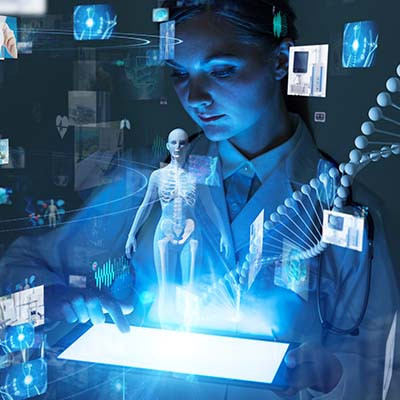Directive Blogs
AI Impacting the Healthcare Industry in Interesting Ways
Healthcare is one industry that consistently operates under an immense amount of pressure, and as such, professionals in the industry are always trying to find new and innovative ways to make things more manageable. The latest technology to aid in this trend is artificial intelligence, or AI, and it has proven to be a considerable asset for the industry. Here are some ways that AI has changed the way healthcare manages particularly stressful situations for the better.
AI Can Efficiently Analyze Vast Troves of Data
No matter how often (or not) you go to the doctor, chances are that your provider only has a fragmented version of your health records, the reason being that it relies on you manually updating them every time you go in for a checkup. Unfortunately, this lack of information can mean that your doctors don’t get the birds-eye view they need to provide the best care possible. AI makes sifting through data like this much easier and more practical, and machine-based predictions can catch things that the human eye might miss. AI could be used to predict health issues before they even appear, meaning that preventative care can be administered promptly (much like addressing issues on your IT network before they become major problems).
AI Can Make New Medicines, Cheaper
When you consider the amount of time and research that goes into crafting effective medicines, you start to realize that there is a reason why it’s not cheap. However, through the same technology that allows automated self-driving cars, databases of molecular structures can be considered and tested through simulations. With this technology, time spent on research and development can be significantly reduced, as evidenced by the 2015 ebola virus outbreak, where analysis and treatment were developed far more quickly thanks to it. AI can also be used to study existing medicines or find new ways for them to be used. If new use cases for existing drugs can be identified, companies can save money and make their offerings more diverse.
AI Can Make Healthcare More Secure
Healthcare providers are responsible for storing and securing a lot of sensitive or personally identifiable information, as well as financial data. Considering that many patients’ lives depend on this data, it becomes incredibly important to keep it all secure, especially with the rise of cybercrime. It might be possible for humans to prevent some of these threats from coming to fruition, but it’s not possible for them to prevent all of them. AI might be able to aid them, though, by powering automated security solutions designed to keep records safe from malicious activity. After all, many threats are using AI themselves, so why not turn the tables on the attackers?
AI Can (Potentially) Help Eliminate Bias
There is an inherent bias in the healthcare industry with factors like race, gender, and ethnicity playing a part in how accessible healthcare is to some. This bias has seeped into research. AI programs can help to eliminate some of this bias, as it is separate from human deliberation and can remain impartial throughout the entire process. AI can effectively identify the objective truth and prevent factors like these from influencing research or access in healthcare.
What are your thoughts on using AI in this way, or in other practical parts of everyday life? Let us know in the comments.


